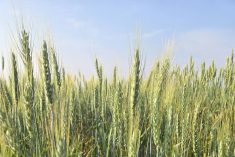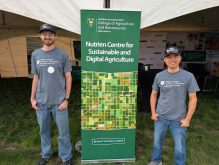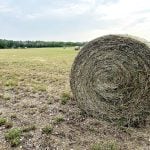The Prairie provinces’ three wheat commissions are set to take a team approach to research funding through a new not-for-profit body.
The Alberta Wheat Commission, Sask Wheat and the Manitoba Wheat and Barley Growers Association on Tuesday announced the formation of the Canadian Wheat Research Coalition (CWRC) to “facilitate long-term investments aimed at improving profitability and competitiveness for western Canadian wheat farmers.”
The commissions, in a joint release, said their new coalition will “facilitate a collaborative approach to producer funding of regional and national research projects in variety development and agronomy, including the next Canadian National Wheat Cluster and core wheat breeding agreements with Agriculture and Agri-Food Canada and universities.”
Read Also

Alberta harvest wrapping up: report
Harvest operations advanced to 96 per cent complete in Alberta as of Oct. 7, with only a few late-seeded cereal and canola fields remaining, according to the latest provincial crop report.
Other “regional” projects that line up with the coalition’s variety development and agronomic priorities will also be considered for funding, they said.
CWRC project funding will be shared on a proportionate basis based on checkoff revenue, the three commissions said.
The new coalition’s structure allows for more producer or private sector groups to join as “organizational members,” providing a platform for the coalition to pursue what it described as “public, private, producer partnerships (4Ps).”
CWRC administration will be handled by a “host” commission, rotating every three years, starting with Sask Wheat.
Eight farmers, including the AWC’s Kevin Auch, Jason Saunders and Terry Young, Sask Wheat’s Ken Rosaasen, Glenn Tait and Laura Reiter, and the MWBGA’s Cale Jeffries and Dylan Wiebe, will sit on the coalition’s first board.
The commissions took on an expanded role in handling checkoff funding after the Western Canadian Deduction (WCD) on wheat and barley sunset on July 31.
All three commissions had single checkoffs in place for Aug. 1, covering both their own work and the WCD’s funding obligations, which include funds for the Western Grains Research Foundation (WGRF), the Canadian Malting Barley Technical Centre and Cigi, the Canadian International Grains Institute.
The WCD checkoffs had been set up in 2012 by the federal government as a transition move following its deregulation of the CWB’s single marketing desk for Prairie wheat and barley.
Where the WGRF previously led research initiatives through WCD funding, the commissions said they will now “ensure continuity” in new spring wheat variety development is maintained through the CWRC, and will engage WGRF as “a key player” through the transition.
The WGRF, which will remain a separate entity, steered by its own board of directors, has already charted a four-year transition plan providing about $18 million per year in research funding out to 2020.
That money, coming from WGRF’s wheat and barley reserve funds, is to cover its core wheat and barley variety development commitments; ongoing funding commitments; new projects focused on “sustainability, resiliency and efficiency” of crop production systems; and new projects dealing with “specific research issues” in intermediate Prairie field crops.
The WGRF has said its transition plan has the commissions’ support and will “ensure the stability of core breeding programs” at Agriculture and Agri-Food Canada and the University of Alberta, University of Saskatchewan and University of Manitoba out to 2020.
“Most of the best performing wheat varieties available to farmers are the result of producer-funded wheat breeding efforts,” Auch said in the commissions’ release Tuesday.
“I look forward to working with my provincial counterparts to continue this work with the goal of seeing new, high-performing varieties that result in better returns and increased competitiveness for farmers.” — AGCanada.com Network
















